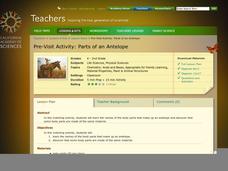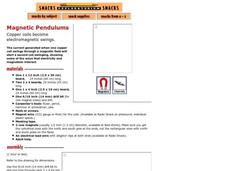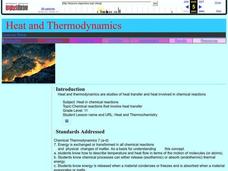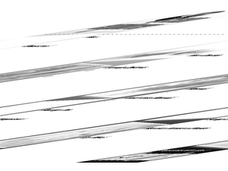Curated OER
Condensation Polymerization
This organic chemistry lab activity is appropriate for teaching polymerization, percent yield, melting point, or the types and uses of polymer materials. Chemistry pupils imagine that they are working for a company to develop a special...
Curated OER
May the Force be with You -- All about Force and Gravity
Here is a fabulous set of teacher's notes that will make your next hands-on gravity and force lab fun and interesting. These notes provide you with three activities that allow children to make and test hypothesis regarding force,...
Curated OER
Exploring Biomes Lesson 2: Biome Research
Learners view a PowerPoint presentation on biomes and their classifications. Divide them into groups and assign them each an individual biome to research. There are pictures of the PowerPoint slides and notes about what to teach for...
Curated OER
Call to Arms: Robotic Analogues for Human Structures
Investigate deep sea discovery through the emerging technology being built. In this physical science lesson, students analyze the different types of motion available in the human arm. Students research educational websites...
California Academy of Science
Parts of an Antelope
There are so many wonderful parts to an animal: fur, antlers, tails, and legs, to name a few. A large diagram of an antelope is used to start a matching game, where the class matches body parts made of the same material. They discuss...
Berkshire Museum
Backyard Rocks
You don't have to travel far to learn about rocks, just step outside, pick up a stone, and begin investigating. After taking a class walk around the school grounds collecting rocks, young scientists practice their skills of observation...
American Chemical Society
Exploring Baking Powder
Meant to follow an activity in which young chemists identified an unknown substance by chemical reactions, they now take their data and use it to determine which materials combine to make up baking powder. This instructional activity is...
Mascil Project
Parachute Food Drop
Drop a perfect project into your lesson plans. Groups use different building materials to create models of parachutes for food drops. After testing out their prototypes, they make improvements to their designs.
Center Science Education
The Nitrogen Cycle Game
Earth science experts learn about the roles of nitrogen by taking a virtual journey through the nitrogen cycle. Completing a passport worksheet along the way, they move from place to place around the classroom by the toss of dice. Each...
Exploratorium
Magnetic Pendulums
Passing a copper wire coil through a magnetic field influences another coil to also sway. It is with this demonstration that you can teach your physical science fans about electromagnetism. Note that the assembly requires about an hour,...
Cornell University
Chemical Reactions
Investigate the Law of Conservation of Mass through a lab exploration. Individuals combine materials to initiate chemical reactions. They monitor for signs of reactions and measure the masses before and after the reactions for...
Curated OER
Heat and Thermodynamics
This is actually a 10-day mini unit on thermal energy for your high school chemists. Every avenue is taken to get learners absorbed in heat: a pretest, a PowerPoint presentation, Internet exploration, demonstrations, lab activities, and...
Curated OER
Anchialine Cave Species
Ever heard of a stygofauna or a stygobite? How about an anchialine cave? Set your young biologists on a quest to find information about organisms that live in and have adapted to life in caves located near the water. Class members then...
Curated OER
Reading Comprehension: History of the Periodic Table
Although the article that launches this lesson is about the history of the Periodic Table, the objective is reading comprehension. Using the eight-page informational text, learners answer five comprehension questions and craft one essay....
Exploratorium
Corner Reflector
If you set up a triad of mirrors into a corner figuration, they act as a kaleidoscope, bouncing light waves back and forth indefinitely, changing the light that your eyes perceive. Although the materials required are very specific and...
American Chemical Society
Neutralizing Acids and Bases
Now that your science class has experimented with pH indicator and identified acids and bases, they attempt to get the cabbage juice indicator back to its original color. This is done through neutralization of the acids and bases that...
Polar Trec
Sea Ice Impact
The arctic seas contain currents that are both warm (with high salinity) and cold (relatively fresh water) that circulate throughout the year. Through discussion, a lab, and a web quest, participants explore the impacts of melting and...
Science Matters
Spaghetti Fault Model
Does increasing the pressure between two moving plates provide a stabilizing force or create more destruction? The hands-on lesson encourages exploration of strike-split fault models. The sixth lesson in a 20-part series asks...
Towson University
Berries...With a Side of DNA?
Sometimes science lab can be ... delicious! Middle school science scholars extract DNA from strawberries and other fruits in an engaging lab activity. The teacher's guide includes pacing, materials list, and worksheets with answer keys.
Cornell University
Nano What?
The size of a nanoparticle is difficult for pupils to grasp. A hands-on experiment is designed to give your classes perspective. Learners analyze different sports drinks for the content of electrolytes as an introduction to nanoscale....
Curated OER
Full Circle Advertising: A Look at Teen Alcohol Use and Fetal Alcohol Syndrome
High schoolers analyze ads and learn about the effects of alcohol. Note that the PowerPoint mentioned in the procedure is not included, so you will need to prepare your own presentation. After the lecture, segue into fetal alcohol...
Curated OER
Earth, The Universe, And Culture
Students examine how science is interpreted based on social environments. They watch and discuss a video, identify scientists and locate their countries of origin on a map, explore various websites, and complete a handout.
Curated OER
Freestanding Structures: A Tech Museum Floor Activity
Students attempt to design the tallest structure that they can with the given materials which are wooden dowels and rubber bands. They discuss the physics of their structure and how they would improve it the next time they built a...
Curated OER
Water and Polymers
Young scholars conduct qualitative and quantitative investigations based on the interaction between water and various polymers. They determine the percent moisture contained in various plastics along with a qualitative procedure to...

























